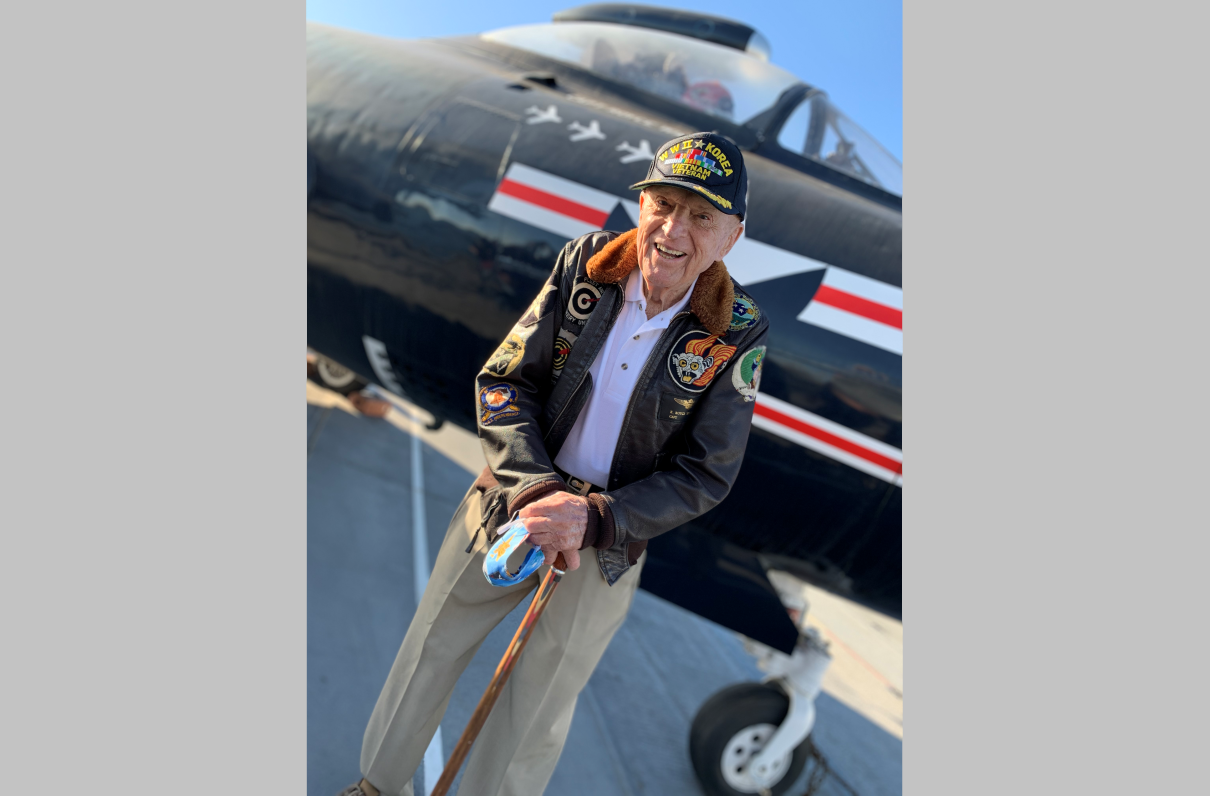Royce Williams’ heroics in the Korean War flew under the radar for more than a half-century.
Now, the 97-year-old retired Navy captain who downed at least four Russian MiGs on Nov. 18, 1952, could be in line for the Medal of Honor.
The House-passed version of the FY 2023 National Defense Authorization Act (NDAA) includes an amendment authorizing the award of the highest military award for valor to Williams, a MOAA member, for the California resident’s courageous actions against long odds. The Senate version has yet to go through that chamber’s full amendment process.
“To me and everyone who learns his story, Royce Williams is more than the Navy’s Top Gun pilot for all time,” said Rep. Darrell Issa (R-Calif.), who initially proposed a bill to award Williams the Medal of Honor last fall and sponsored the House NDAA amendment. “His courage under fire and service to our country in a time of war should be an inspiration for all Americans. While Royce seeks neither fame nor recognition, those of us who know him and know what he did won’t give up until our mission to honor him is a success.”
‘I Knew the Airplane Was in Bad Shape’
On that day in 1952, Williams’ team of F9F-5 Panthers had just conducted an airstrike on the Hoeryong industrial complex near the Korea-Soviet Union border when Williams and his wingman, Dave Rowlands, were surprisingly engaged by seven enemy MiGs. Rowlands pursued one of the MiGs out of formation, leaving Williams to deal with the other six.
As the MiGs buzzed by him, Williams was able to shoot down the trail plane before entering in a high stakes cat-and-mouse game in blizzard-like conditions. The end result of a 35-minute dogfight: four downed MiGs, one damaged MiG, and Williams’ badly beat up Panther.
With 263 bullet holes and limited ability to steer, Williams was able to limp back to USS Oriskany (CVA-34), but not before initially encountering friendly fire due to a miscommunication between the gunnery liaison and the combat information center, Williams said. Eventually, he screamed onto the deck of the carrier at 170 knots, well above the normal landing speed.
“I wouldn’t say I was worried, but I was aware of my situation,” said Williams. “…I knew the airplane was in bad shape. It took two hands on the stick to really control it and I knew there was an option to bail out. … But if I did, in those conditions, I would have survived for maybe less than 20 minutes.”
After the ordeal was over, he was briefed that his mission was not to be revealed to anyone due to the sensitive relationship between the former Soviet Union and the U.S. at the time. Williams received Silver Star and credit for one downed plane and one damaged plane, but he did not speak of that day until Korean War documents were declassified five decades later.
His heroics weren’t fully revealed until Russian author Igor Seidov chronicled the dogfight in his 2014 book Red Devils Over the Yalu. The book mentions that only one of the seven MiGs returned safely to the Soviet Union, according to a recent San Diego Union-Tribune story.
Seeking Recognition
“It was far more dramatic than what he ever shared or what he saw,” said friend Steve Lewandowski, a Navy veteran and former commander of American Legion Post 416 who has lobbied for Williams’ Medal of Honor. “When he was in the middle of it, he didn’t have time to admire his work.”
“I could not concentrate on the guy I shot up because there was another guy on my tail,” said Williams, who went on to fly combat missions in the Vietnam War.
Lewandowski has been working with other veterans service organizations and the San Diego congressional contingent to get Williams that long-awaited honor. Earlier efforts by the late Rear Adm. Doniphan Shelton, USN, a longtime MOAA member, failed due to a lack of documentation and by not corralling congressional support early enough in the process, Lewandowski said.
“This guy is a hero for all Americans,” said Lewandowski, who named the Medal of Honor efforts Operation Just Reward.
[RELATED: 4 Vietnam Vets Awarded Medals of Honor in White House Ceremony]
A Life in the Air
Williams’ path to aviation greatness was laid out early in life, riding as a passenger in a Ford Tri-Motor at the age of 4 over the pastures of South Dakota. By age 14, he was sitting aside a local pilot in a two-seat single-engine prop airplane barnstorming local county fairs.
Williams signed up for the Army as a teenager before joining the Navy during World War II as a Naval Aviation Cadet. Nine years later, he put on one of the finest displays of dogfighting in American military history.
When asked what it would be like to receive the medal, Williams said he wishes his father, a World War I veteran, could be there to see it.
“He was a great patriot and a lot of that rubbed off on me and my brother,” Williams said.
Military Officer Magazine
Check out our award-winning monthly magazine. MOAA PREMIUM and LIFE members have access to all editions here.

